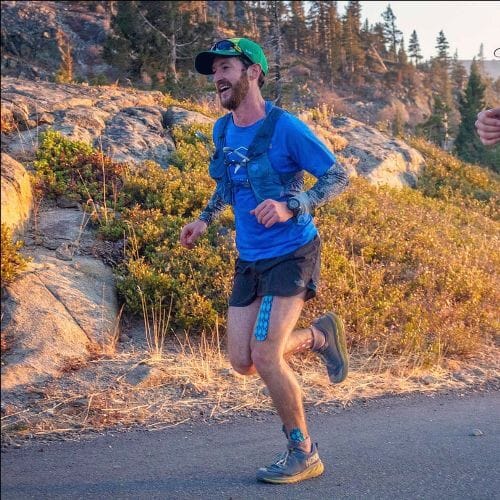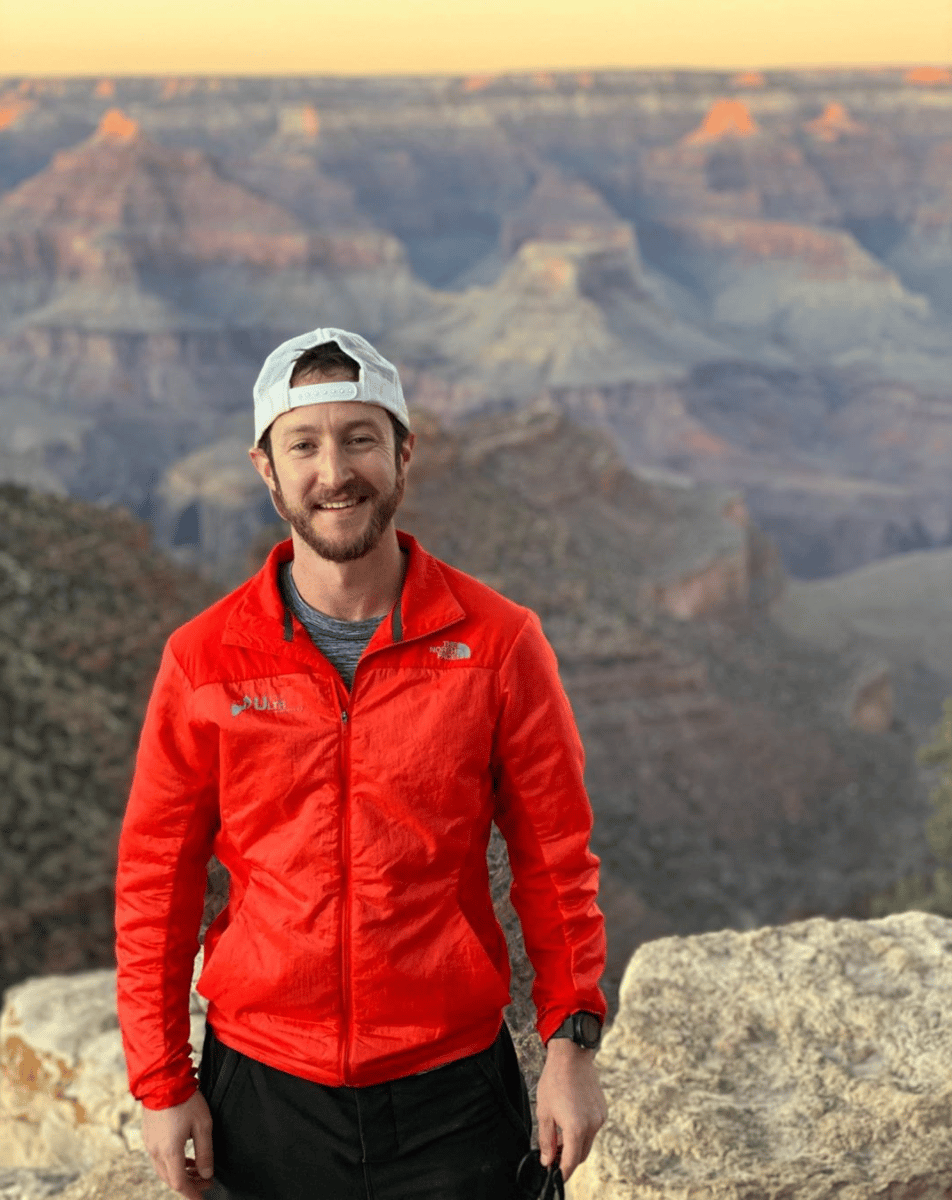It’s My Birthday! Let’s Celebrate!
It’s my birthday today!!!! And I want to give YOU a gift. We’ve teamed up with one of our favorite partners, Tifosi, to bring you a HUGE discount for my birthday. Use code HAPPY35 to get 35% off your sunnies for every season.
How a Pro Runner Finds Gratitude in the Sport, Partnerships, and High Altitude with Reid Burrows
Finding the Edges of Speed and Endurance
Reid Burrows didn’t set out to become an ultrarunner. His early years in the sport were focused on speed: fast 5Ks, competitive track racing, and pushing the limits of what he could do on the roads. But as his running evolved, the appeal of longer, wilder terrain started pulling him in.
That curiosity led to a career that now spans distances from the mile to 100K, with a focus on exploring what he calls the “edges” of his ability.
The Pivot Point: Injury and Perspective
Like many athletes, Reid’s trajectory wasn’t all smooth upward progress. A major injury forced him to step back and reconsider how he was training and why he was doing it in the first place.
The downtime taught him the importance of recovery, patience, and mental resilience. It also reshaped his identity as a runner: instead of defining himself solely by race results, he started valuing the process and the community that came with it.
Chasing Big Goals with Balance
Reid’s training now is still demanding, but it’s grounded in a healthier balance. He’s chasing fast times on the roads while also competing in ultras—a dual focus that keeps him mentally fresh.
The key, he says, is knowing when to go all-in and when to hold back.
It’s not just about stacking the biggest weeks, it’s about making the work you can do as intentional and high-quality as possible.
One of the biggest shifts in Reid’s career has been moving from a self-focused approach to a more outward-facing one. As a coach, he now channels his experience into helping other runners achieve their goals.
That work has reinforced his belief that running is about much more than numbers on a watch.
Some of his most rewarding moments aren’t his own races but seeing athletes he coaches have those breakthroughs.
Learning to Listen to the Body
Reid is quick to admit that in his early career, he didn’t always listen to the signals his body was sending. That mindset contributed to overtraining, injuries, and periods of burnout.
Now, he uses a more adaptive approach: monitoring not just physical markers but also mood, motivation, and stress.
Your body’s telling you a story every day. The question is whether you’re listening.
Why Mental Skills Matter as Much as Physical Ones
When asked about the biggest difference between good and great athletes, Reid points to the mental game. Visualization, emotional regulation, and perspective are all skills he’s honed over the years.
Everyone’s training hard. The ones who can handle the pressure, stay composed, and adapt in the moment—that’s where you see the difference.
Racing in the Mountains
While Reid’s road racing background still plays a big role in his calendar, the mountains have become a place where he feels both challenged and renewed.
He credits his road speed for giving him an edge in certain trail races, while the variability of trails has helped him become a more durable and adaptable athlete overall.
Coaching Philosophy
Reid’s coaching approach is rooted in communication, trust, and sustainability. He emphasizes that no two athletes are the same, and training plans should reflect that individuality.
It’s not about following some cookie-cutter plan. It’s about building something that fits into an athlete’s life and goals, not the other way around.
What You’ll Learn in This Episode
Reid’s journey from speed-focused racing to mountain ultras
How injury reshaped his mindset and training
The mental skills that separate good from great athletes
Why balance is key to longevity in sport
His coaching philosophy and approach to athlete development
Give this one a listen this weekend 👇
Partner Programs That Actually Work? Meet Superfiliate. 🚀
If you’ve ever wanted to build an affiliate program without the headache, this is your sign. Superfiliate is the clean, no-BS affiliate platform I’ve been recommending for years — and for good reason.
Whether you’re on the brand side or working with creators, Superfiliate keeps it simple: intuitive setup, effortless tracking, and seamless payouts. No bloated dashboards. No tangled workflows. Just tools that do their job so you can do yours.
Bonus: Superfiliate helps you actually engage your partners with cobranded landing pages, UGC, rewards (cash, credit, gifts!), and more.
If you’re ready to grow your program without growing your stress, head to Superfiliate.com — and tell them I sent you. 💸
Erin Sprague on Running, Climate Advocacy, and the Outdoor State
From Adirondack Trails to the Global Climate Stage
Erin Sprague grew up running the trails and roads of the Adirondacks, following in the footsteps of her father, a track and field athlete and New York State police officer. She raced competitively through high school and college, and running has remained a constant: a source of discovery, survival, and community.
Today, Erin lives in Boulder, Colorado, where she balances marathon training with leading one of the most prominent climate advocacy organizations in the outdoor industry: Protect Our Winters (POW).
Why Runners Should Care About Climate
POW is a community of outdoor athletes — runners, skiers, cyclists, snowboarders — working to connect the sports they love with meaningful climate action.
Erin sees a unique opportunity for runners to step into advocacy. Historically, she says, runners haven’t had to fight for access the way cyclists or hunters have. But that’s changing as climate impacts become impossible to ignore: rising temperatures altering race calendars, wildfire smoke canceling long runs, and unpredictable weather affecting training and competition.
High-Leverage Climate Action: Clean Energy on the Grid
When people ask where to start, Erin points to one of the most impactful solutions: replacing fossil fuels with clean energy sources like solar and wind.
She emphasizes that systemic changes, not just individual recycling or composting, are key. While personal habits matter, large-scale policy shifts determine the energy sources powering our homes, transportation, and infrastructure.
Advocacy That Works
POW focuses on policy influence through what Erin calls the “Outdoor State” — the 180 million Americans who recreate outside. By showing up in Washington, D.C. with world-class athletes, POW connects shared humanity with policy discussions.
She’s seen bipartisan progress when outdoor voices unite, from protecting public lands to defending clean energy incentives. Even small legislative wins, she notes, can signal the power of organized advocacy.
How Runners Can Join the Movement
Erin’s roadmap for involvement starts with learning and grows into collective action:
Educate Yourself: Seek out climate-focused podcasts, articles, and events.
Join a Movement: Sign up for Team POW or a similar advocacy group.
Use Your Voice: Contact elected officials about climate policy.
Vote Every Time: Especially in local and midterm elections, where turnout is low.
Bring Your Community: Invite running partners, clubs, and race directors into the conversation.
Takeaways for Endurance Athletes
1. Your Community Is a Force. The running community spans geographies, politics, and incomes: a perfect foundation for bipartisan climate action.
2. Big Impact Comes from Big Systems. Switching the grid to clean energy is one of the fastest, most effective ways to reduce emissions.
3. Partnerships Multiply Reach. From solar companies to EV makers, aligning sponsorships with sustainability can create financial and environmental wins.
4. Public Lands Are Everyone’s Responsibility. Losing them is permanent. Advocacy keeps them protected for recreation and biodiversity.
A Solvable Problem
Despite the political headwinds, Erin remains optimistic. She explains that climate is a solvable problem. We have all the technology we need. The challenge is building the political will and common ground to use it.
She believes the same persistence that carries runners through grueling training cycles can carry the outdoor community through the climate fight, mile after mile, conversation after conversation.
Get a Clearer Picture of Your Health 📈
I’m thrilled to introduce our new partner, Eternal — a performance health company built for runners, endurance athletes, and anyone serious about their training. Their two-hour in-person performance physical goes way beyond a standard checkup with mobility assessments, metabolic testing, bloodwork, and a full movement analysis from real experts.
Whether you’re chasing PRs or just want a clearer picture of your health, Eternal helps you run harder and longer. Book your performance physical at eternal.co, use the code FTLR for 10% off, and keep doing what you love for years to come.
About Jon Levitt and For The Long Run
Jon is a runner, cyclist, and podcast host from Boston, MA, who now lives in Boulder, CO. For The Long Run is aimed at exploring the why behind what keeps runners running long, strong, and motivated.
Follow Jon on Instagram, LinkedIn, and Twitter.





